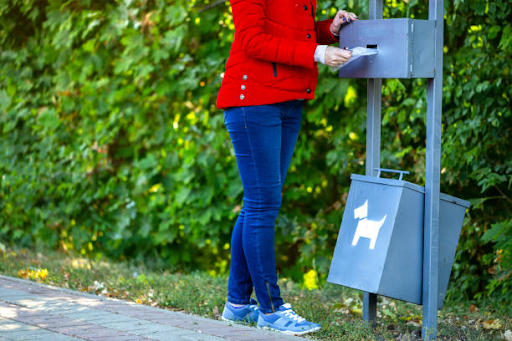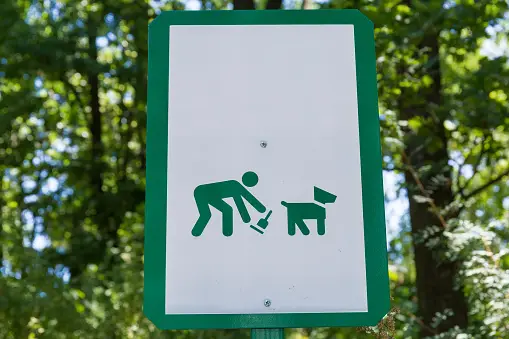As a responsible dog owner, it's crucial to prioritize proper waste management for your furry friend. Did you know that an average-sized dog produces approximately 274 pounds of waste annually? That's a staggering amount! Ensuring effective disposal is not only a matter of cleanliness but also a responsibility towards the environment and community. In this blog, we will explore the importance of responsible dog waste management and highlight the numerous benefits of having a reliable dog poop disposal system in place. From maintaining a hygienic living space to safeguarding public health, let's uncover why every dog owner needs a dependable solution for this inevitable task.
Health and Environmental Hazards of Neglected Dog Waste
Neglecting proper disposal of dog waste can lead to various health risks for both humans and pets. When left unattended, dog waste can harbor harmful bacteria, parasites, and viruses that can cause infections and diseases. These risks include gastrointestinal issues, respiratory illnesses, and even zoonotic diseases that can be transmitted between animals and humans.
Improperly disposed dog waste also poses a significant environmental impact. When dog waste is not picked up or disposed of correctly, it can contaminate soil and water sources, leading to the spread of harmful pathogens and polluting local ecosystems.
Advantages of Using a Reliable Dog Poop Disposal System

A. Maintaining a clean and hygienic living environment:
A reliable dog poop disposal system ensures that waste is promptly removed, preventing unsightly and unhygienic conditions in your surroundings.
B. Minimizing the spread of diseases and parasites:
Proper waste management helps minimize the risk of diseases and parasites that can be present in dog waste, protecting both humans and other animals.
C. Reducing unpleasant odors and pests:
By promptly removing dog waste, you can effectively reduce unpleasant odors and discourage pests, such as flies and rodents, from being attracted to your property.
D. Protecting the local ecosystem and water sources:
A reliable disposal system prevents the contamination of local ecosystems and water sources, ensuring the health and well-being of the environment and wildlife.
Types of Dog Poop Disposal Systems

When it comes to choosing the right dog poop disposal system, there are various options available. Let's explore some common types:
Traditional plastic bags
Widely used and easily accessible, these bags offer a convenient solution for picking up dog waste.
Biodegradable bags
Environmentally friendly, these bags break down naturally over time, reducing their impact on the planet.
Flushable bags
Designed to be safely flushed down the toilet, these bags provide a convenient and hygienic disposal option.
Dog waste composters
These systems use natural decomposition to turn dog waste into nutrient-rich compost for your garden.
In-ground waste digesters
Buried in the ground, these digesters break down dog waste using enzymes, minimizing odor and promoting decomposition.
Pet waste stations
Often found in public spaces, these stations provide a centralized location for dog owners to dispose of waste properly.
Each system has its advantages and considerations. Choose the one that best fits your needs and aligns with your environmental values.
Factors to Consider When Choosing a Dog Poop Disposal System
Choosing the right dog poop disposal system requires careful consideration of several key factors. Addressing these pinpoints will ensure an efficient and suitable solution for your specific needs:
Size and breed of the dog: Larger dogs produce more waste, so opt for a disposal system that can accommodate their size.
Number of dogs in the household: Multiple dogs generate additional waste, necessitating a system with larger capacity.
Available space and yard layout: Assess the area where the disposal system will be placed to ensure it fits appropriately.
Local regulations and restrictions: Familiarize yourself with any specific guidelines or rules regarding dog waste disposal in your area.
Climate and weather conditions: Choose a system that can withstand varying weather conditions without compromising functionality.
Maintenance requirements and cost-effectiveness: Consider the maintenance needs and long-term cost of the disposal system to find one that aligns with your budget and time constraints.
By considering these factors, you can select a dog poop disposal system that meets your dog's waste output, yard layout, local regulations, and personal preferences.
How to Properly Use a Dog Poop Disposal System
To ensure effective waste management, it's essential to know how to properly use a dog poop disposal system. Here are step-by-step instructions for different types of disposal systems:
Traditional plastic bags:
Place your hand inside the bag, pick up the waste, and turn the bag inside out.Securely tie the bag to prevent any leakage.
Dispose of the bag in designated trash bins, ensuring proper waste management.Biodegradable bags:
Follow the same steps as traditional plastic bags, ensuring proper sealing to maintain eco-friendliness.
Flushable bags:
Check the bag's instructions to confirm its flushability.
After picking up the waste, place the bag in the toilet and flush.Remember to always emphasize proper hygiene practices. Wash your hands thoroughly with soap and water after handling dog waste to minimize health risks and maintain cleanliness.
Tips for Responsible Dog Waste Management
A. Encouraging dog owners to pick up after their pets:
Encouraging dog owners to pick up after their pets is essential for maintaining a clean environment. Carry dog waste bags during walks and dispose of them properly in designated trash bins. It shows respect for others and helps prevent the spread of diseases.
B. Proper disposal etiquette in public spaces:
In public spaces, be mindful of others by promptly disposing of dog waste. Avoid leaving bags on the ground or in open areas. Look for designated dog waste bins or trash receptacles and use them appropriately.
C. Educating dog owners about local waste management resources:
Educating dog owners about local waste management resources is crucial. Share information about nearby pet waste stations, disposal guidelines, and any available community programs that promote responsible waste management.
Conclusion
In conclusion, it is undeniable that every dog owner needs a reliable dog poop disposal system. By recapitulating the importance of responsible waste management, we understand the significance of keeping our surroundings clean and hygienic. Did you know that an estimated 10 million tons of dog waste is generated annually in the United States alone? Neglected dog waste can pose serious health risks to both humans and pets, while also contributing to environmental pollution. Therefore, it is crucial for dog owners to take responsibility and choose a suitable disposal system. Let us promote responsible dog ownership, adhere to waste management practices, and collectively create a cleaner, healthier environment for everyone. Together, we can make a positive impact, one scoop at a time.
Frequently Asked Questions (FAQ)
A: It's important to clean up dog waste immediately to maintain cleanliness and prevent the spread of diseases.
A: Local regulations may vary, so it's important to check with your municipality for specific guidelines on dog waste disposal.
A: Use designated pet waste stations or carry biodegradable bags to pick up and properly dispose of dog waste in public areas.
A: Unattended dog waste can contaminate soil, water sources, and attract pests, leading to health hazards and environmental pollution.



